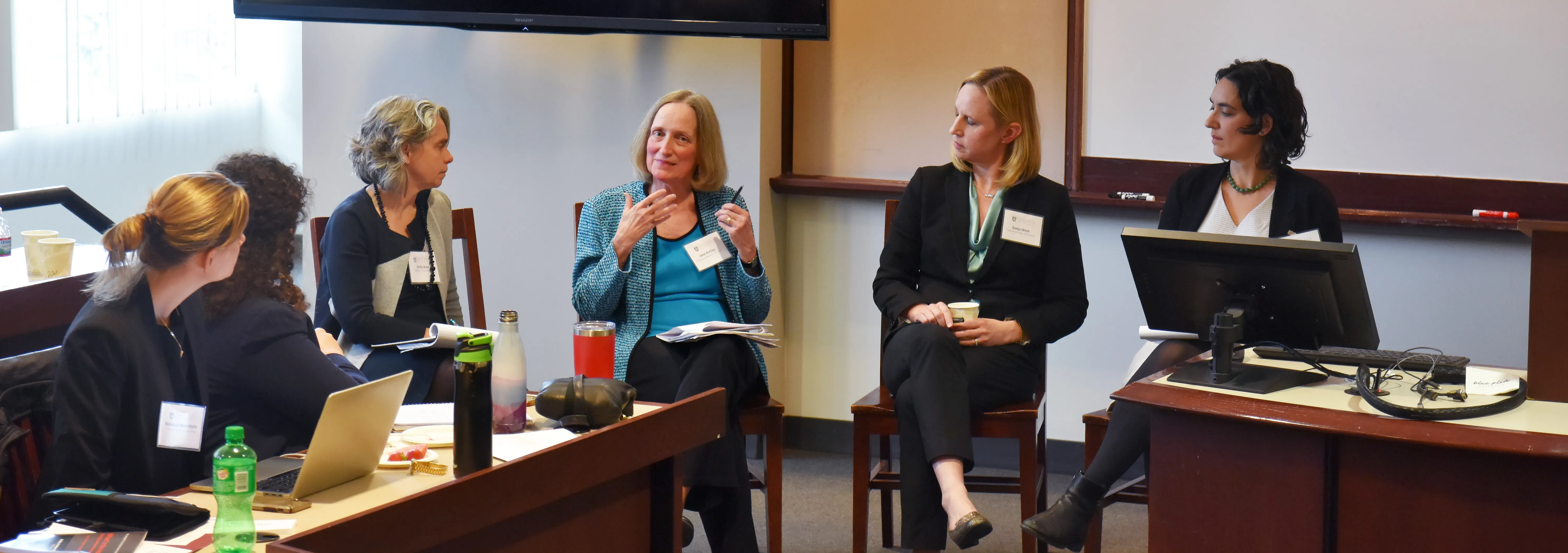Scholars Explore Future of the First Amendment at Annual Legal Forum Symposium

Not all online activity is speech, and not all attempts to regulate that activity should qualify as censorship, a recent MacArthur “genius grant” winner said last week at the annual University of Chicago Legal Forum symposium, a student-run event that brought more than a dozen leading scholars to the Law School to discuss free speech in today’s culture. But, she added, “the First Amendment is eating all conversation” about online discussion, leading to myths and confusion that have stymied reform efforts.
“Dispelling the myths surrounding speech, censorship, and liability are necessary before effective policy discussions are possible,” said 2019 MacArthur Fellow Danielle Citron, a professor at Boston University School of Law and one of the panelists at the day-long conference, “What’s the Harm? The Future of the First Amendment.”
Citron’s presentation, part of a panel on First Amendment harm moderated by Law School Professor William Baude, centered around Section 230 of the Communications Decency Act, which provides immunity from liability for those who publish information provided by others on the Internet. It was one of several animated debates at a conference that explored a variety of tough issues—from the defense of false speech to the demise of obscenity laws—and drew more than 100 attendees over the course of the day.
“In a world where commentators are regularly questioning the strength of our nation's democracy, it seems natural that scholars, students, and members of the public would be drawn to discuss how one of our key constitutional provisions should optimally function,” said Nika Arzoumanian, ’20, the editor-in-chief of the Legal Forum. “Yet, I was still blown away by the level of engagement and quality of discourse at the Law School on Friday. I could not have been more pleased with this year's Legal Forum symposium.”
Added Professor Genevieve Lakier, who served as the conference’s faculty advisor: “What I liked best about the conference was how the lively and vigorous discussion of free speech law—its promises and its perils—extended beyond any one panel. This made the symposium really work as an event: it felt like the participants were thinking together the whole day long.”
Concerns about unequal power came up repeatedly throughout the day. P.E. Moskowitz, a journalist and author of The Case against Free Speech: The First Amendment, Fascism and the Future of Dissent argued that the United States has never real had free speech. “Free speech is a propaganda tool” that people with money and influence have manipulated to better promote their positions, Moskowitz said.
Speech itself sometimes enables discrimination, too, argued Helen Norton of the University of Colorado Law School. For instance, a variety of state, local, and federal laws now prohibit employers, lenders, and other decision-makers from asking applicants about pregnancy, sexual orientation, disability, and more—but some commercial entities have argued that such regulations inhibit their free speech rights, she said.
Presenters raised a variety of provocative questions about the future of the First Amendment, often sparking energetic discussion.
Leslie Kendrick of the University of Virginia Law School considered whether the right to freedom of speech must automatically protect harmful speech. “Obviously,” she noted, “there are some costs that come with free speech. But can free speech ensure that we are free to exercise that right without harm?” Important scholars have argued that freedom of speech must protect harmful conduct, but Kendrick argued that this is not necessarily true.
Kendrick’s University of Virginia colleague, Fred Schauer, questioned whether a person whose free speech rights had been abridged should be entitled to compensation. “When the government takes your land for a train station or some other public good, you get paid,” he said. “With speech, you are just forgotten about.”
In a keynote address, Harvard Law Professor Cass Sunstein discussed lapidation, the public shaming of individuals who have said the wrong thing, whether by intention or mistake. He explored how society should respond to lapidation—sometimes referred to as “cancel” or “call-out” culture—pointing out that responses often reflect out-of-proportion, and sometimes even violent or extreme, reactions.
Lakier said she appreciated presenters’ willingness to question long-accepted tenets of free speech law, pointing to Kendrick, Schauer, and Sunstein as examples.
“In all three cases, their remarks unsettled well-established conventions: that the First Amendment must protect harmful speech; that no compensation is owed those whose speech rights are permissibly abridged by the government; and that the First Amendment has nothing to say about call-out culture when it doesn't rise to the level of defamation,” she said.
“The result,” she added, “was a lively, often surprising, and vigorous debate about what freedom of speech should mean today.”
The papers presented at the symposium will be published in the next issue of the University of Chicago Legal Forum journal, due out in late 2020.

